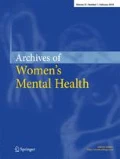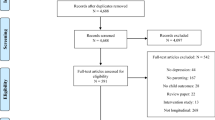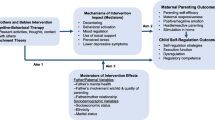Abstract
Maternal depression is a potent risk factor for poor child development across a number of domains but the mechanisms of transmission are poorly understood. This study aimed to test competing mediators of the association between pre-conception maternal depression and child psychosocial functioning. In 2016, mothers in the 1973–1978 cohort of the Australian Longitudinal Study on Women’s Health were asked to be part of the Mothers and their Children’s Health study and to complete surveys on the health of their three youngest children under 13 years. The current study includes children aged 0–12 years (N = 5532, M = 6.99 years, SD = 3.22 years) and their mothers (N = 2917). We used the CESD-10 to measure depression and the PedsQL to measure psychosocial functioning, and used multilevel structural equation modeling to test hypotheses. Pre-conception maternal depression was associated with poorer maternal mental health and parenting after birth. The effect of pre-conception maternal depression was mediated by post-birth maternal depression in children aged 0–4 years (unstandardized regression coefficient (B) = − 0.26, 95%CI − 0.38, − 0.13) and children aged 5–12 years (B = − 0.25, 95%CI − 0.34, − 0.16), and by post-birth maternal stress (B = − 0.04, 95%CI − 0.08, − 0.01), and parenting (B = − 0.03, 95%CI − 0.04, − 0.02) in children aged 5–12 years. Post-birth maternal depression was the strongest mediator. Pre-conception is the optimal time for depression intervention. Post-birth interventions should include a focus on reducing depression and improving negative parenting aspects such as hostility and discipline.



Similar content being viewed by others
Change history
05 December 2019
The current sentence is in the discussion (sub-section The role of pre-conception maternal depression) and reads: ���Pre-conception treatment of mental health issues is also associated with substantial savings in health care costs (Chojenta et al., 2018).���
References
Ahun MN, Côté SM (2018) Maternal depressive symptoms and early childhood cognitive development: a review of putative environmental mediators. Arch Womens Ment Health. https://doi.org/10.1007/s00737-018-0870-x
Andresen EM, Malmgren JA, Carter WB, Patrick DL (1994) Screening for depression in well older adults: evaluation of a short form of the CES-D. Am J Prev Med 10:77–84
Australian Institute of Health and Welfare (2012) A picture of Australia’s children 2012. Canberra: AIHW. https://www.aihw.gov.au/getmedia/31c0a364-dbac-4e88-8761-d9c87bc2dc29/14116.pdf.aspx?inline=true. Accessed 14 Jan 2019
Bagner DM, Pettit JW, Lewinsohn PM, Seeley JR (2010) Effect of maternal depression on child behavior: a sensitive period? J Am Acad Child Adolesc Psychiatry 49:699–707. https://doi.org/10.1016/j.jaac.2010.03.012
Baker C, Kuhn L (2017) Mediated pathways from maternal depression and early parenting to children’s executive function and externalizing behaviour problems. Infant Child Dev 27:e2047. https://doi.org/10.1002/icd.2047
Bell S, Lee C (2002) Development of the perceived stress questionnaire for young women. Psychol Health Med 7:189–201
Bell S, Lee C (2003) Perceived stress revisited: the Women’s Health Australia project young cohort. Psychol Health Med 8:343–353
Chojenta C, Loxton D, Lucke J (2012) How do previous mental health, social support, and stressful life events contribute to postnatal depression in a representative sample of Australian women? J Midwifery Womens Health 57:145–150. https://doi.org/10.1111/j.1542-2011.2011.00140.x
Chojenta CL, Lucke JC, Forder PM, Loxton DJ (2016) Maternal health factors as risks for postnatal depression: a prospective longitudinal study. PLoS One 11:e0147246. https://doi.org/10.1371/journal.pone.0147246
Chojenta C, William J, Martin MA, Byles J, Loxton D (2018) The impact of a history of poor mental health on health care costs in the perinatal period. Arch Womens Ment Health. https://doi.org/10.1007/s00737-018-0912-4
Cohen NL (2017) Public health perspectives on depressive disorders. JHU Press, Baltimore
Dittrich K, Fuchs A, Bermpohl F, Meyer J, Führer D, Reichl C, Reck C, Kluczniok D, Kaess M, Hindi Attar C, Möhler E, Bierbaum AL, Zietlow AL, Jaite C, Winter SM, Herpertz SC, Brunner R, Bödeker K, Resch F (2018) Effects of maternal history of depression and early life maltreatment on children’s health-related quality of life. J Affect Disord 225:280–288
Dobson AJ, Hockey R, Brown WJ, Byles JE, Loxton DJ, McLaughlin D, Tooth LR, Mishra GD (2015) Cohort profile update: Australian Longitudinal Study on Women’s Health. Int J Epidemiol 44:1547–1547f
Dougherty LR, Tolep MR, Smith VC, Rose S (2013) Early exposure to parental depression and parenting: associations with young offspring’s stress physiology and oppositional behavior. J Abnorm Child Psychol 41:1299–1310
Drury SS, Scaramella L, Zeanah CH (2016) The neurobiological impact of postpartum maternal depression: prevention and intervention approaches. Child Adolesc Psychiatr Clin N Am 25:179–200
Elgar FJ, McGrath PJ, Waschbusch DA, Stewart SH, Curtis LJ (2004) Mutual influences on maternal depression and child adjustment problems. Clin Psychol Rev 24:441–459
Elgar FJ, Mills RS, McGrath PJ, Waschbusch DA, Brownridge DA (2007a) Maternal and paternal depressive symptoms and child maladjustment: the mediating role of parental behavior. J Abnorm Child Psychol 35:943–955
Elgar FJ, Waschbusch DA, Dadds MR, Sigvaldason N (2007b) Development and validation of a short form of the Alabama Parenting Questionnaire. J Child Fam Stud 16:243–259
Feeney R, Desha L, Khan A, Ziviani J, Nicholson JM (2016) Speech and language difficulties along with other child and family factors associated with health related quality of life of Australian children. Appl Res Qual Life 11:1379–1397
Field AP (2013) Discovering statistics using IBM SPSS statistics: and sex and drugs and rock ‘n’ roll, 4th edn. Sage, Los Angeles
Fisher SD, Brock RL, O’Hara MW, Kopelman R, Stuart S (2015) Longitudinal contribution of maternal and paternal depression to toddler behaviors: Interparental conflict and later depression as mediators. Couple Fam Psychol 4:61
Furukawa T et al (1997) Screening for depression among first-visit psychiatric patients: comparison of different scoring methods for the Center for Epidemiologic Studies Depression Scale using receiver operating characteristic analyses. Psychiatry Clin Neurosci 51:71–78. https://doi.org/10.1111/j.1440-1819.1997.tb02910.x
Galbally M, Lewis AJ (2017) Depression and parenting: the need for improved intervention models. Curr Opin Psychol 15:61–65
Giallo R, Cooklin A, Wade C, D’Esposito F, Nicholson J (2014) Maternal postnatal mental health and later emotional–behavioural development of children: the mediating role of parenting behaviour. Child Care Health Dev 40:327–336
Goodman SH (2007) Depression in mothers. Annu Rev Clin Psychol 3:107–135
Goodman SH, Gotlib IH (1999) Risk for psychopathology in the children of depressed mothers: a developmental model for understanding mechanisms of transmission. Psychol Rev 106:458–490
Goodman SH, Rouse MH, Connell AM, Broth MR, Hall CM, Heyward D (2011) Maternal depression and child psychopathology: a meta-analytic review. Clin Child Fam Psychol Rev 14:1–27
Hammen C (2017) Maternal depression and the intergenerational transmission of depression. In: Cohen NL (ed) Public health perspectives on depressive disorders. John Hopkins University Press, Baltimore, pp 147–170
Hammen C, Shih JH, Brennan PA (2004) Intergenerational transmission of depression: test of an interpersonal stress model in a community sample. J Consult Clin Psychol 72:511–522
Hu L, Bentler PM (1999) Cutoff criteria for fit indexes in covariance structure analysis: conventional criteria versus new alternatives. Struct Equ Model Multidiscip J 6:1–55
Kingsbury AM, Clavarino A, Mamun A, Saiepour N, Najman J (2017) Does having a difficult child lead to poor maternal mental health? Public Health 146:46–55
Lahti M et al (2017) Maternal depressive symptoms during and after pregnancy and psychiatric problems in children. J Am Acad Child Adolesc Psychiatry 56:30–39. e37
Lebel C, Walton M, Letourneau N, Giesbrecht GF, Kaplan BJ, Dewey D (2016) Prepartum and postpartum maternal depressive symptoms are related to children’s brain structure in preschool. Biol Psychiatry 80:859–868
Lee C, Dobson AJ, Brown WJ, Bryson L, Byles J, Warner-Smith P, Young AF (2005) Cohort profile: the Australian Longitudinal Study on Women’s Health. Int J Epidemiol 34:987–991
Letourneau N, Salmani M, Duffett-Leger L (2010) Maternal depressive symptoms and parenting of children from birth to 12 years. West J Nurs Res 32:662–685
Lovejoy MC, Graczyk PA, O’Hare E, Neuman G (2000) Maternal depression and parenting behavior: a meta-analytic review. Clin Psychol Rev 20:561–592
Loxton D et al (2017) Cohort profile: the Australian Longitudinal Study on Women’s Health (ALSWH) 1989–95 cohort. Int J Epidemiol 47:391–392e. https://doi.org/10.1093/ije/dyx133
Mishra GD, Moss K, Loos C, Dobson AJ, Davies PS, Loxton D, Hesketh KD, Koupil I, Bower C, Sly P, Tooth L (2018) MatCH (Mothers and their Children’s Health) Profile: offspring of the 1973-78 cohort of the Australian Longitudinal Study on Women’s Health. Longit Life Course Stud 9:351–375
Nievar MA, Moske AK, Johnson DJ, Chen Q (2014) Parenting practices in preschool leading to later cognitive competence: a family stress model. Early Educ Dev 25:318–337
Park M, Brain U, Grunau RE, Diamond A, Oberlander TF (2018) Maternal depression trajectories from pregnancy to 3 years postpartum are associated with children’s behavior and executive functions at 3 and 6 years. Arch Womens Ment Health 21:353–363
Paterson G, Sanson A (1999) The association of behavioural adjustment to temperament, parenting and family characteristics among 5-year-old children. Soc Dev 8:293–309
Powers J, Loxton D (2010) The impact of attrition in an 11-year prospective longitudinal study of younger women. Ann Epidemiol 20:318–321
Preacher KJ, Zyphur MJ, Zhang Z (2010) A general multilevel SEM framework for assessing multilevel mediation. Psychol Methods 15:209–233
Reilly N, Harris S, Loxton D, Chojenta C, Forder P, Milgrom J, Austin MP (2013) Referral for management of emotional health issues during the perinatal period: does mental health assessment make a difference? Birth 40:297–306. https://doi.org/10.1111/birt.12067
Reilly N, Harris S, Loxton D, Chojenta C, Forder P, Austin M-P (2014) The impact of routine assessment of past or current mental health on help-seeking in the perinatal period. Women Birth 27:e20–e27. https://doi.org/10.1016/j.wombi.2014.07.003
Stein A, Pearson RM, Goodman SH, Rapa E, Rahman A, McCallum M, Howard LM, Pariante CM (2014) Effects of perinatal mental disorders on the fetus and child. Lancet 384:1800–1819
Stephenson J, Heslehurst N, Hall J, Schoenaker DAJM, Hutchinson J, Cade JE, Poston L, Barrett G, Crozier SR, Barker M, Kumaran K, Yajnik CS, Baird J, Mishra GD (2018) Before the beginning: nutrition and lifestyle in the preconception period and its importance for future health. Lancet 391:1830–1841. https://doi.org/10.1016/S0140-6736(18)30311-8
Underwood L, Waldie K, D’Souza S, Peterson E, Morton S (2016) A review of longitudinal studies on antenatal and postnatal depression. Arch Womens Ment Health 19:711–720. https://doi.org/10.1007/s00737-016-0629-1
US Department of Education (2001) Early Childhood Longitudinal Study, Birth Cohort. National Centre for Education Statistics, Washington, DC
Varni JW, Seid M, Rode CA (1999) The PedsQL™: measurement model for the pediatric quality of life inventory. Med Care 37:126–139
Varni JW, Seid M, Kurtin PS (2001) PedsQL™ 4.0: reliability and validity of the Pediatric Quality of Life Inventory™ Version 4.0 Generic Core Scales in healthy and patient populations. Med Care 39:800–812
Werner E, Miller M, Osborne LM, Kuzava S, Monk C (2015) Preventing postpartum depression: review and recommendations. Arch Womens Ment Health 18:41–60
Zubrick SR, Lucas N, Westrupp EM, Nicholson JM (2014) Pareenting measures in the Longitudinal Study of Australian Children: construct validity and measurement quality, Waves 1 to 4. Department of Social Services, Canberra
Acknowledgements
The research on which this paper is based was conducted as part of the Australian Longitudinal Study on Women’s Health by the University of Queensland and The University of Newcastle. We are grateful to the Australian Government Department of Health for funding and to the women who provided the survey data.
Funding
MatCH is funded by the National Health and Medical Research Council (NHMRC) project grant (APP1059550). GM is supported by an NHMRC Principal Research Fellowship (APP1121844).
Author information
Authors and Affiliations
Corresponding author
Ethics declarations
Conflict of interest
The authors declare that they have no conflict of interest.
Ethical approval
Ethics approval for this study was obtained from The University of Queensland and The University of Newcastle, and women provided written informed consent for themselves and their children. All procedures performed were in accordance with the ethical standards of the institutional and national research committees and with the 1964 Helsinki declaration and its later amendments or comparable ethical standards.
Additional information
Publisher’s note
Springer Nature remains neutral with regard to jurisdictional claims in published maps and institutional affiliations.
Electronic supplementary material
ESM 1
(DOCX 221 kb)
Rights and permissions
About this article
Cite this article
Moss, K.M., Loxton, D., Dobson, A.J. et al. Testing competing mediators of the association between pre-conception maternal depression and child health-related quality of life: the MatCH study. Arch Womens Ment Health 23, 53–62 (2020). https://doi.org/10.1007/s00737-019-0941-7
Received:
Accepted:
Published:
Issue Date:
DOI: https://doi.org/10.1007/s00737-019-0941-7




